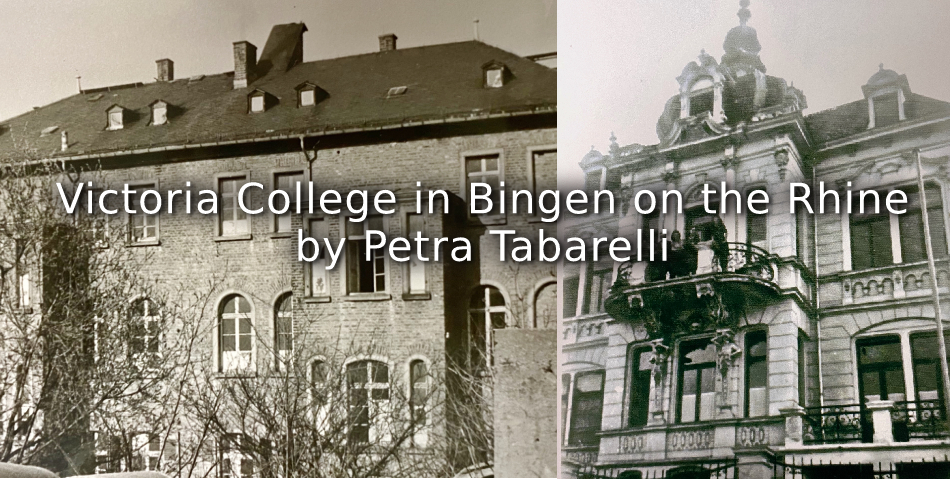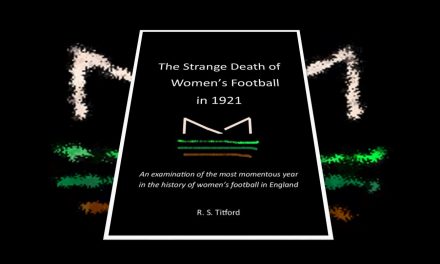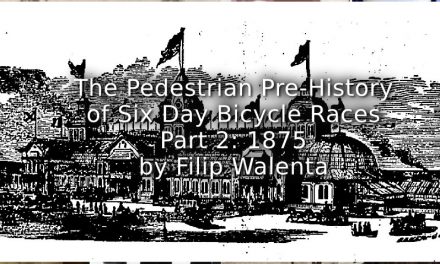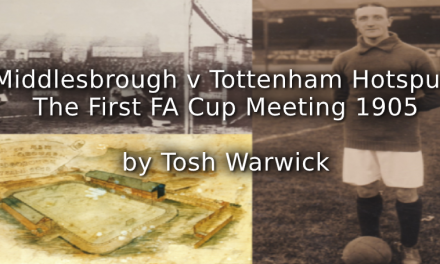Bingen on the Rhine is not only the title of a well-known poem, but also famous for its landscape: the Rhine Romanticism begins here, at the confluence of the Rhine and Nahe rivers, directly at the Mäuseturm and the “Bingerloch”, which has only been passable for shipping since 1841. Before that, numerous underwater reefs endangered ships – similar to the well-known Loreley a few miles downstream on the Rhine.

Figure 1
A coloured drawing of the Bingerloch from the 1820s. The waves of the Rhine pile up into gout in the foreground of the engraving
Rocks protrude dangerously from the water. Bingen can be seen in the background
Source: City of Bingen, Museum am Strom
In the 19th century, it was mainly British people who visited Bingen. Some of them were long-term tourists, others used the trade routes, which had been very good since Roman times, to sell their goods in Germany. The Bingen wine trade also attracted many of them to Bingen.
It is all too likely that the various sports were played in Bingen on the Rhine at an early stage, especially the different types of football. There were enough pitches in the town and in the immediate vicinity. As is so often the case in continental Europe, the sports were a bring-along of UK tourists and traders.
If one goes in search of traces, one is surprised to find that the oldest mention of a football match only dates back to 1893. Equally surprising is the school institution whose students formed a football club and played against other students in Wiesbaden: Virtually nothing is known about Victoria College in Bingen on the Rhine.
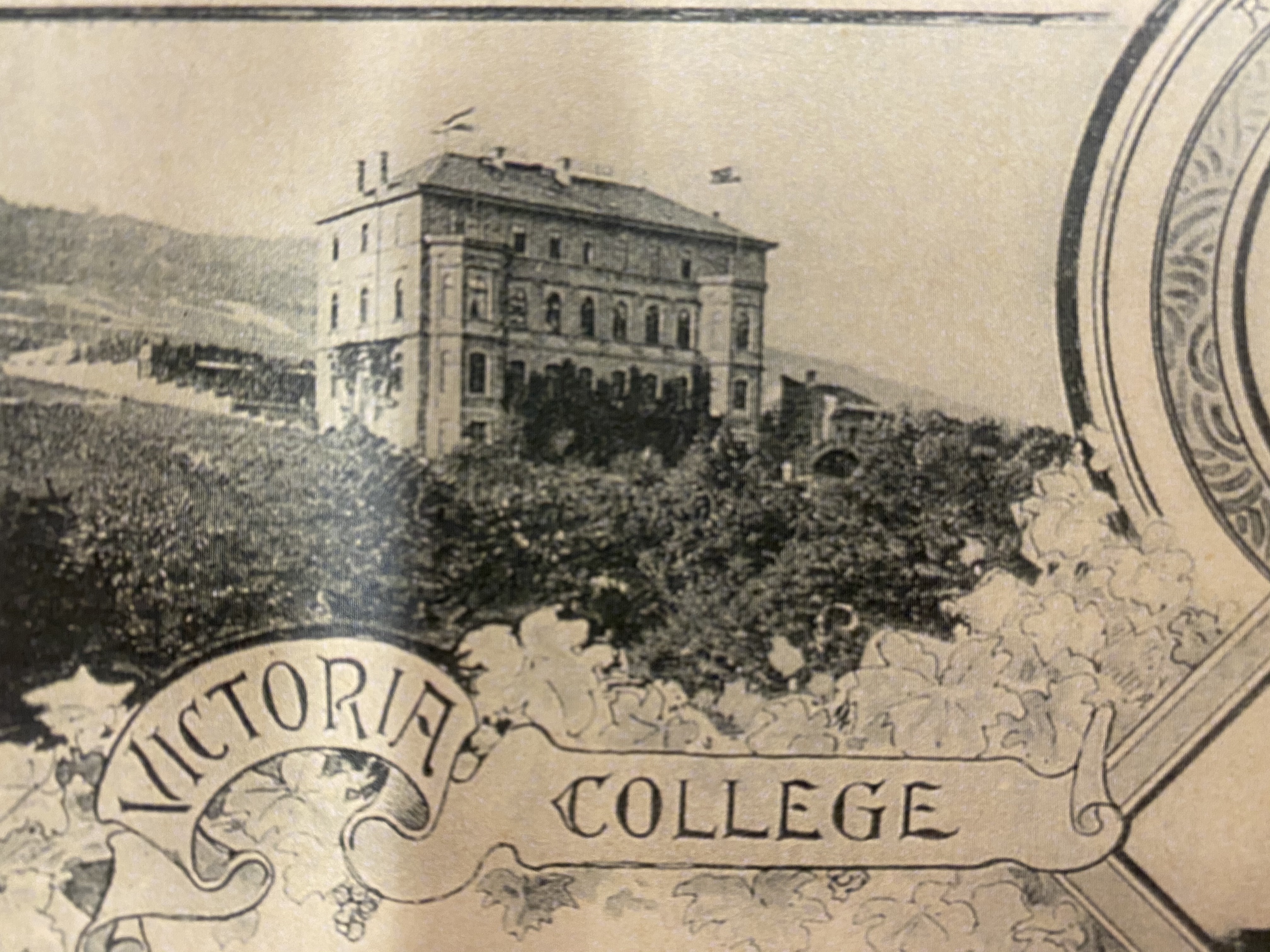
Figure 2
A detail from a postcard with Bingen sights, including Victoria College with lettering in the top left corner
However, the postcard did not go to England, but was sent to Fulda in central Germany
Source: City of Bingen, Bingen Archiv, Collection Seyler
The Victoria College
Almost twenty years before the founding of what is now Bingen’s oldest football club, Hassia Bingen, there was an English school in Mainzer Strasse (Mainz Road), Victoria College – named after the then reigning Queen of England. Mainzer Strasse was the villa street in Bingen with many magnificent buildings.
The Victoria College building was built in 1884 by order of Alfred Mess as a residential and institute building – so it says in the old fire cadastre, which is in the Bingen town archives: A three-storey residential and institute building with a basement, two bay windows and two staircases.
Much is unknown
Alfred Mess was the headmaster of Victoria College. A German who obviously maintained very good networks to England. Where Mess came from, how old he was and when he died is completely unknown. He had previously studied “the requirements of English education” in England and was in an English town at least once a year between 1886 and 1892 so that parents could register their sons for Victoria College.
The Derby Daily Telegraph of 29 and 30 July 1890 carried the following announcement
“Victoria College, Bingen on the Rhine.
The Principal, Mr Alfred Mess, purposes spending a day at Derby early in September. The date will be given on application. Prospectus contains a photograph of the school, ful[!] particulars, testimonials, and numerous references, some in this neighbourhood.“
and in the Yorkshire Post and Leeds Intelligencer of 4 January 1887:
“Highly recommended School for Young Gentlemen. The Principal, Mr. Alfred Mess, purposes being at the Queen’s Hotel, Leeds, on Tuesday the 11th January, from noon till 4 p.m., when he will be happy to meet parents wishing to see him. Full particulars and numerous English references are given in the prospectus.“
He also advertised frequently in English, especially northern English, newspapers between 1886 and 1895. Several announcements appeared annually in the Newcastle Daily Chronicle, similar to this one
“This School for Young English Gentlemen is situated on one of the most beautiful parts of the Rhine. Herr Mess during his residence in England, having studied the requirements of English Education, endeavors to meet them, and at the same time to give his Pupils a thorough Conversational and Grammatical knowledge of German and French, such as can only be acquired on the Continent.” (Newcastle Daily Chronicle on 14, 28 and 31 December 1886
or
“The above School for Young English Gentlemen is conducted on the Principal of enabling them to acquire, by diligence, a thorough German and French Education such as is usually obtained only by German Youths, after years of study.” (Newcastle Daily Chronicle, 11 January 1892)

Figure 3
One of the many advertisements by headmaster Alfred Mess in English newspapers
This one, among others, appeared on the front page of the Sheffield Independent of 4 January 1888
Source: British Newspaper Archive
The lecturers and students at Victoria College
The students at the college were predominantly or exclusively British. Among them was Charles Edward Squire (1874-1961), who spent his school years at Gateshead School in Newcastle and Victoria College in Bingen. He is the only student of Victoria College whose name is known.
Similarly with the lecturers: Apart from Alfred Mess, only the name of one other teacher is known: H. Arnold Jutzi, who is mentioned in the Lancashire Evening Post on 21 October 1892:
“A class in German will commence on Wednesday, Oct. 18th, 1892, which will be taught by Mr. H. Arnold Jutzi, of the Victoria College.”
Whether the Victoria College football club was founded by students or the initiative came from H. Arnold Jutzi. In general, very little is available about the college in the Bingen Archives; no records at all were found in other German archives. There are no lists of pupils, curricula or even references to sports.
Most mentions could be found in the British Newspaper Archive, but there again only advertisements by Alfred Mess.
A Call for Research
Dear UK sports historians: in your research, have you perhaps come across any Bingen travellers, Victoria College students or Alfred Mess, Arnold Jutzi or other teachers at the College? I am happy to receive any little hints about Victoria College and people it connects. Or even about earlier sources that sports were practised in Bingen.
Dear family researchers: Do you have ancestors who went to school at Victoria College or lived for a while in Bingen on the Rhine? Feel free to contact me.
I would be grateful for any pieces of the puzzle that would enable me to trace the origins of sports in Bingen on the Rhine.
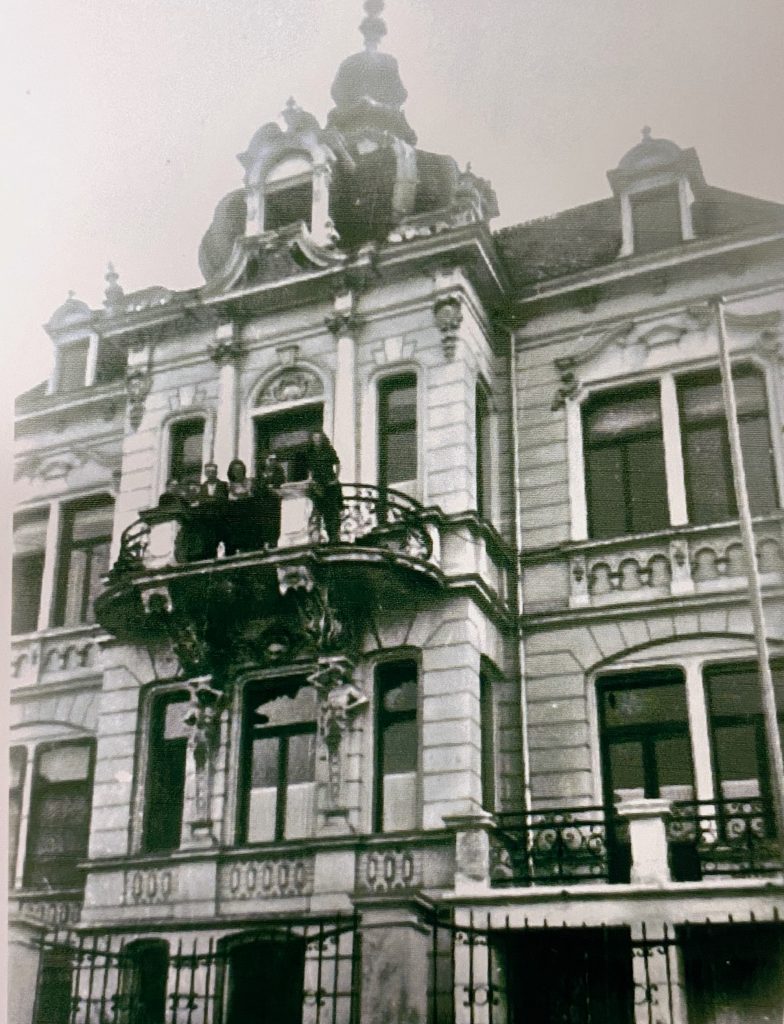
Figure 4
This photo shows Victoria College before the bomb damage of the Second World War
The photo was taken in 1942. At that time, the local NSDAP Air Raid Protection Headquarter was located in this building
Source: City of Bingen, Bingen Archiv
What happened to Victoria College?
Victoria College existed until 1904, when it was sold to the headmaster of the Bingen Technikum (now TH Bingen), Hermann Hoepke. The Technikum was a higher educational institution for students to learn the new technological advances. Hugo Gernsback, father of SciFi, also studied here for a time.
The Victoria College building was not used for teaching, however, but as a residence for lecturers and students. In 1919, after the First World War and at the beginning of the occupation, it was rented to Johann Baptist Weinand from Cologne, and during the Nazi period to the NSDAP. This was the place from where the air-raid protection for the Bingen area was coordinated.
Even after the Second World War, it remained reserved for military purposes for the time being, because during the renewed occupation period, the French Flotille du Rhin rented the building.
In 1956, Hermann Hoepke’s descendants sold the building to the state of Rhineland-Palatinate, which set up the Rhineland-Palatinate Air Defence School here. A few years later it was demolished to make room for the new vocational school.
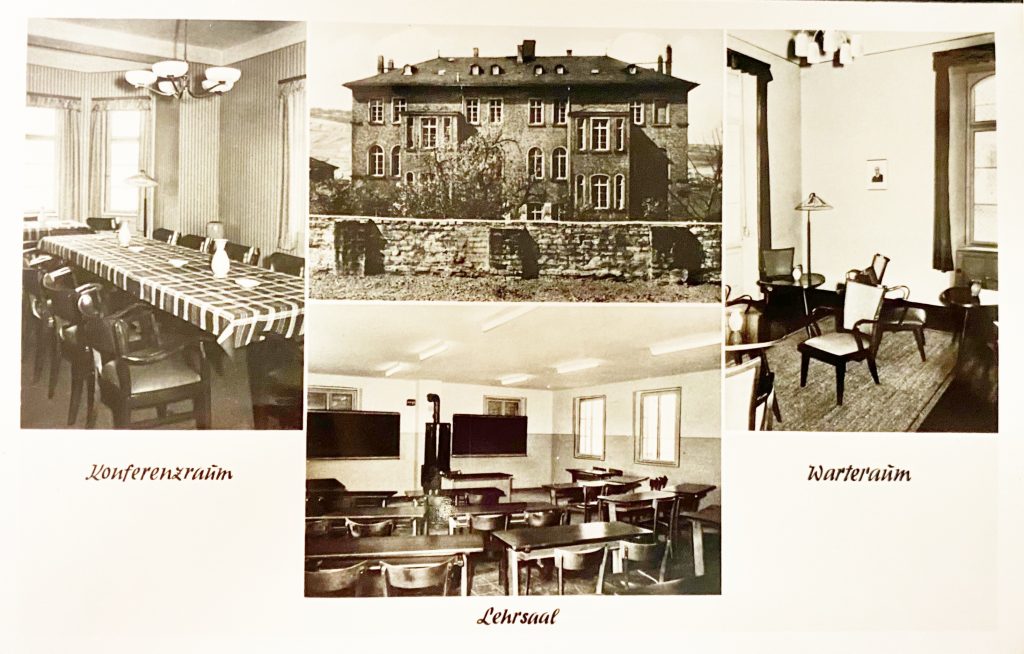
Figure 5
The postcard shows the interior of Victoria College as the Air Defence School of Rhineland-Palatinate
Source: City of Bingen, Bingen Archiv
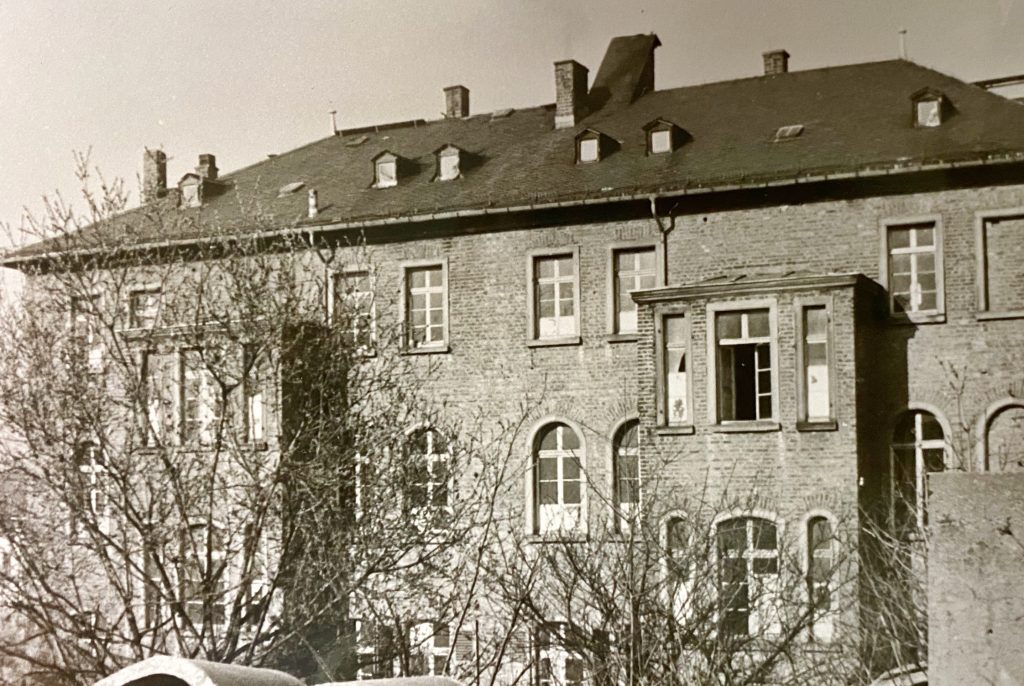
Figure 6
Victoria College shortly before its demolition
Source: City of Bingen, Bingen Archiv
Article @ of Petra Tabarelli

